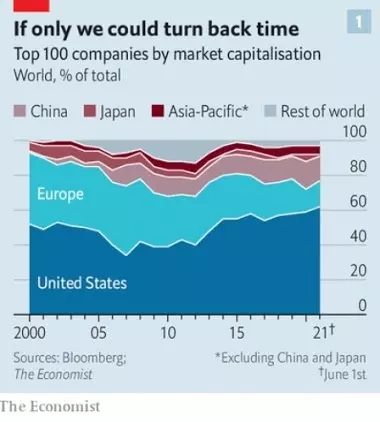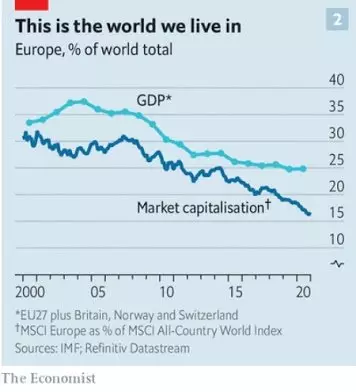Comments
- No comments found

The Economist titled its article on European corporations: "The land that ambition forgot. Europe is now a corporate also-ran. Can it recover its footing?" (June 5, 2021).
The article is well worth reading, but here are a couple of snapshots and my own reactions. Notice in particular that these changes are fairly recent. The horizontal axis in these graphs starts only two decades ago.
The share of EU companies among the largest in the world has been declining: "In 2000 nearly a third of the combined value of the world’s 1,000 biggest listed firms was in Europe, and a quarter of their profits. In just 20 years those figures have fallen by almost half."

Here's the EU share of the global economy, and also the stock market capitalization of EU companies compared to global stock market capitalization. The message here is not just that both shares have declined substantially. Notice also that back around 2000 the EU share of the global economy and the share of the EU in global stock market capitalization were roughly the same, but that is no longer true. 
Europe has often been a world leader in drawing up rules and regulations that companies must follow, in areas including digital privacy, environmental protection, use of genetic modification technologies, and so on. However, the EU countries have overall, judging by performance, have not been an especially friendly place to start or run a company, The European Union itself remains a fractured economic zone, separated by barriers set up by national governments, as well as by language and cultural differences.
The Economist writes that big EU companies have in recent decades been preferring to expand their sales and operations overseas, rather than in their home base.
Companies are social mechanisms both for organizing current and future production, and also for planning and investment needed for future innovations in production methods and new products. Europe has a smaller share of these engines of production.
Timothy Taylor is an American economist. He is managing editor of the Journal of Economic Perspectives, a quarterly academic journal produced at Macalester College and published by the American Economic Association. Taylor received his Bachelor of Arts degree from Haverford College and a master's degree in economics from Stanford University. At Stanford, he was winner of the award for excellent teaching in a large class (more than 30 students) given by the Associated Students of Stanford University. At Minnesota, he was named a Distinguished Lecturer by the Department of Economics and voted Teacher of the Year by the master's degree students at the Hubert H. Humphrey Institute of Public Affairs. Taylor has been a guest speaker for groups of teachers of high school economics, visiting diplomats from eastern Europe, talk-radio shows, and community groups. From 1989 to 1997, Professor Taylor wrote an economics opinion column for the San Jose Mercury-News. He has published multiple lectures on economics through The Teaching Company. With Rudolph Penner and Isabel Sawhill, he is co-author of Updating America's Social Contract (2000), whose first chapter provided an early radical centrist perspective, "An Agenda for the Radical Middle". Taylor is also the author of The Instant Economist: Everything You Need to Know About How the Economy Works, published by the Penguin Group in 2012. The fourth edition of Taylor's Principles of Economics textbook was published by Textbook Media in 2017.
Leave your comments
Post comment as a guest